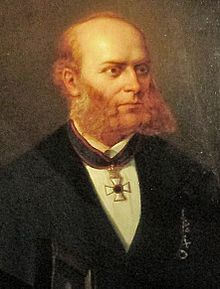Gustav von Epstein
Gustav Epstein , from 1866: Gustav Ritter von Epstein (born April 10, 1828 in Prague ; died September 23, 1879 in Vienna ) was an Austrian industrialist and banker. He had the Palais Epstein built on Vienna's Ringstrasse and the Villa Epstein in Baden near Vienna (local: Rainer Villa from 1874 ).
Life
Gustav Epstein was the son of the Prague textile industrialist, wholesaler and banker Lazar (Leopold) Epstein. His father got rich in the Napoleonic Wars . Lazar Epstein opened a branch in Vienna in the 1840s and increasingly acted as a banker.
Gustav Epstein became head of the cotton printing factories in Bohemia at the age of 21, and at the age of 27 he was an authorized signatory in his father's wholesale business in Vienna. His wife Emilie came from the prestigious Prague Jewish family Wehle (parents: Leopold G. Wehle, † September 6, 1889, age: 80; Julie Wehle née Drosa, † July 4, 1876 in Karlsbad , age: 65). After his father's death, Gustav Epstein sold his father's company and founded Bank Epstein in Vienna in 1864 with the money he had earned. In the war against Prussia in 1866, Epstein loyal to the emperor supported the efforts of the Danube monarchy with large sums of money. With a resolution of August 31, 1866, he was awarded the Order of the Iron Crown III by Emperor Franz Joseph I. Class awarded. Associated with this was the increase in status to hereditary knighthood .
Gustav Ritter von Epstein subsequently acquired the most expensive building site on the Ringstrasse, the property next to Parliament, had the magnificent Palais Epstein built by Theophil Hansen and, for a number of years, developed a wide-ranging public activity as a stock exchange advisor and director of the Austrian National Bank , board member of Westbahn and member of the board of various large construction companies. He was a manager in the organizations of the sugar, oil and paper industry and held high positions in the Chamber of Commerce and the trade association. From 1867 until his death he was on the board of the Israelitische Kultusgemeinde .
However , Epstein's fortune was largely destroyed by the stock market crash of 1873 . On May 26, 1873, the Neue Freie Presse reported that Adolf Taussig, cashier of the Epstein bank, had made a fatal leap. Taussig had speculated with money from Epstein's coffers. It was difficult to avoid bankruptcy; Epstein held the palace with the help of mortgages until the death of his seriously ill 17-year-old son Friedrich Joseph in January 1876.
Gustav Ritter von Epstein himself died of throat cancer at the age of 51 and was buried in the old Israelite section of the Vienna Central Cemetery.
Brigitte Hamann describes Gustav von Epstein according to contemporary sources as:
“Tall and slim, with a beard trimmed in the English fashion. He is serious and sensitive, of poor health and always very pale complexion. A well-traveled, multilingual man of education and great interest in art, but a man who is committed to the public. He draws his self-confidence not from his money, but from the public respect that grows for him from his offices and numerous honorary functions "
literature
- Brigitte Hamann: The Palais Epstein throughout history in: Parliament in Transition - Open Parliament? FORUM PARLIAMENT Vol. 3, No. 2/2005, p. 49 ff.
Web links
- Brigitte Hamann on the history of the family and the palace (PDF file; 72 kB)
- Entry on Gustav von Epstein in the Austria Forum (in the AEIOU Austria Lexicon )
- Gustav Ritter von Epstein ( Memento from May 1, 2008 in the Internet Archive )
- † Gustav Ritter von Epstein. In: Neue Freie Presse , Abendblatt, September 23, 1879, p. 1 (online at ANNO ).
Individual evidence
- ↑ https://www.parlament.gv.at/GEBF/EPSTEIN/FAMILIEEPSTEIN/BauherrPalais
- ↑ The suicide of the cassier Taussig. In: Neue Freie Presse , May 26, 1873, p. 3 (online at ANNO ).
| personal data | |
|---|---|
| SURNAME | Epstein, Gustav von |
| ALTERNATIVE NAMES | Epstein, Gustav Ritter von |
| BRIEF DESCRIPTION | Austrian industrialist and banker |
| DATE OF BIRTH | April 10, 1828 |
| PLACE OF BIRTH | Prague |
| DATE OF DEATH | September 23, 1879 |
| Place of death | Vienna |


